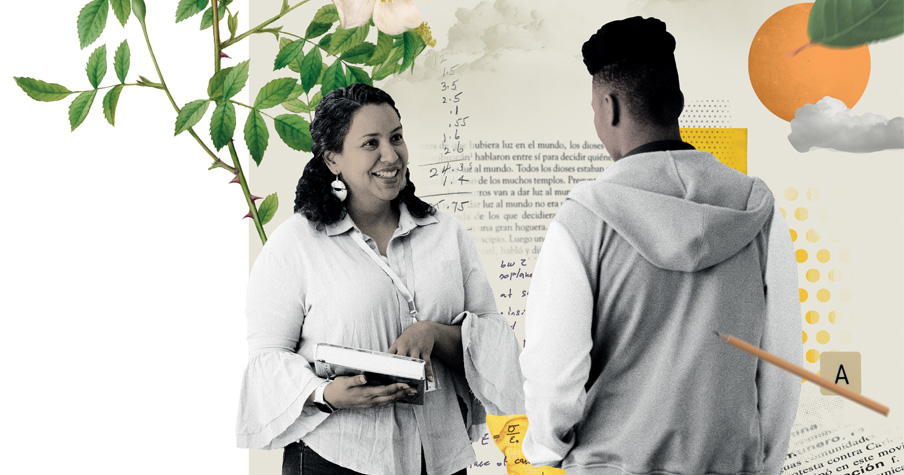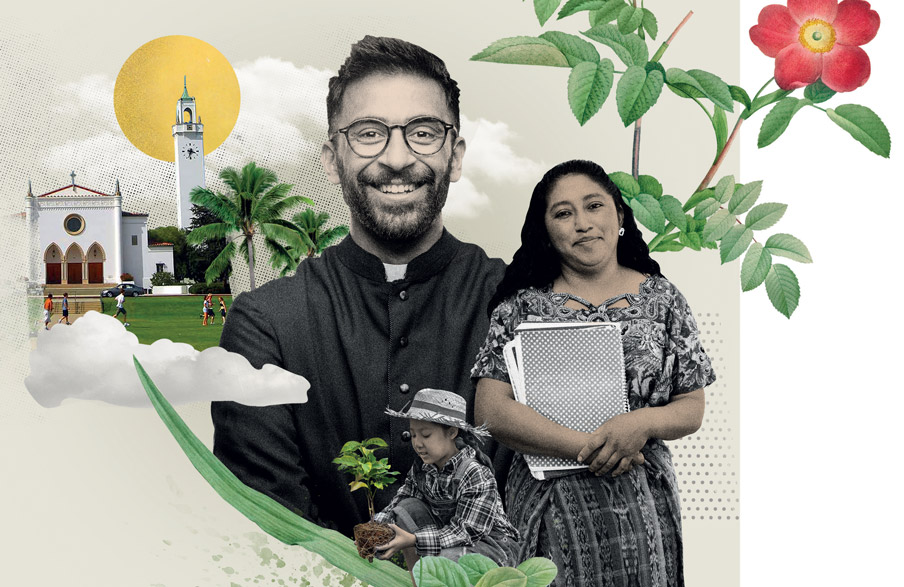
Illustrations by Nazario Graziano
Amir Hussain may seem an unlikely choice to guide a U.S. Jesuit university’s ambitious partnership with the Catholic Archdiocese of Greater Los Angeles to educate the next generation of Roman Catholic ministers and leaders. Born in a Catholic hospital in Pakistan, raised in Toronto by Muslim parents who worked in factories, Hussain is a scholar of Islam, a Muslim who earned his M.A. and Ph.D. in the study of religion at the University of Toronto. In 2005, he joined the Department of Theological Studies at Loyola Marymount University (LMU) in Los Angeles, California, one of 28 universities operating in the U.S. under the auspices of the Society of Jesus (Jesuits). He is currently the department’s chair – the first non-Christian to hold that position.
For Hussain, communicating across religious and cultural differences is a way of life. He left the Cal State system when it proclaimed that its prime directive is to educate the workforce. “I want to educate world citizens,” he said. “L.A. is marvelous – the most religiously diverse city in the world.”
During his nearly two decades at Loyola Marymount, Hussain has seen a rise in demand for his specialty, the history of Muslims in North America, and his decades of studying and teaching comparative world religions provide valuable insights for the challenges facing the Archdiocese, ranging from demographic changes among both the clergy and the faithful to educational attainment gaps that threaten the capacity to support the Church’s wide-ranging ministries.
The episcopate includes the counties of Los Angeles, Orange, and Ventura, along with the Inland Empire (San Bernardino and Riverside Counties), home to more than 18 million people. With over four million Catholics in the region, it is the largest diocese in the United States, and until the end of the 20th century it comprised churches populated predominantly by the descendants of Irish and Italian immigrants and led by pastors with traditional priestly education and formation.
Today, demographic changes in the region and in the Church itself have created some challenges for the Archdiocese. A steady decline in the numbers of priests continues; in the past 20 years, there has been a 31 percent decline in active and retired religious priests, according to data from the Official Catholic Directory. During the same period, the number of deacons – formally trained laypersons ordained to serve in ministries of Charity, Word, and Liturgy, but with limited sacramental and liturgical authority – has more than doubled.
Over those two decades a new generation of churchgoers has emerged. Now predominantly Latino, it presents a complex set of demands for the diocese and its capacity to prepare a new generation of priests and other Church leaders.
For one, it is far more internally diverse than previous generations: There are new immigrants from Mexico, Guatemala, and El Salvador, who share a language but not a country of origin or, for the moment, a fully formed culture in diaspora. Socioeconomically, these parishioners range from middle-class professionals and small business owners to technicians and farm workers.
These challenges are inhibiting the Church’s capacity to hire qualified deacons who might fill some of the gaps in the clergy, administrative staff, and Catholic school teachers with relevant educational credentials. In the Inland Empire only 11 percent of Latino adults have bachelor’s degrees, compared to 29 percent of non-Hispanic whites in the region and 35 percent of Hispanics in the state, according to a study by the UC Riverside Center for Social Innovation.
Finally, the underlying social compact that historically has shaped a significant part of Catholic mission and outreach is being forged anew in the Archdiocese, shaped by rapidly changing socio-economic and cultural mores of a new and assimilating generation.

Exceptional needs, exceptional opportunities
This nearly “perfect storm” has proven a propitious match for the objectives of the Lilly Endowment Pathways for Tomorrow Initiative, announced in January 2021 to support innovation among theological schools and strengthen their educational and financial capacities to support churches, pastors, and lay ministers.
In June 2021, LMU was awarded a $50,000 planning grant in the first phase of Pathways funding. In November 2021, the school was awarded a $1 million grant in the second phase to support Transforming Catholic Leadership in Southern California, an innovative set of efforts to make the conventional routes to college and graduate school more accessible; support more students to progress from the General Equivalency Diploma (GED) to the Bachelor of Arts; and experiment with ways to eventually allow people to directly pursue pastoral education offered in graduate school without having earned a bachelor’s or associate degree.
Hussain took the lead on the planning work in the first phase. During the second phase, he is collaborating with the LMU Center for Religion and Spirituality (CRS), which provides a mix of on-campus, online, and hybrid programs in its role as “an interdisciplinary center of learning and research dedicated to continuing education in ministry, theology, and spirituality to the general public.” CRS offers certificate and professional programs, but no degree programs; it also provides mentoring for those with extensive pastoral experience who have not achieved a degree and want to pursue an associate degree.
The Pathways-funded project will focus on growing the pipelines between Catholic high schools and the undergraduate theological studies program, and between undergraduate and graduate programs, namely the M.A. in Theology and the M.A. in Pastoral Theology.
CRS Director Robert Hurteau, Ph.D., said that the Center already is helping students, notably Latino students, access the education they need for ministry.
“Both the University and Church have made efforts to make that happen,” he said. “University faculty teach in an English-Spanish bilingual Bible program and in seminars for the Archdiocese’s Institute for Pastoral Ministry and Evangelization. And in some years, two thirds of the continuing education programs at CRS are taught in Spanish.”
CRS also provides academic mentoring for community college students combined with congregational leadership and pastoral skills under an arrangement with Los Angeles Trade Technical College.
“At every parish, there are people who have studied somewhere with LMU-affiliated teachers,” said Hurteau, who joined LMU in 2005.
CRS has another advantage: It has more financial flexibility in what it charges than courses in LMU’s degree-granting programs, which must be self-supporting. With grant support, CRS students might pay as little as $130 for a class; in the 2022-23 academic year, master’s degree students at LMU pay $1,383 per unit and undergraduates pay $2,276 per semester hour. The continuing education model also is academically flexible, allowing students to get started when they don’t meet regular admissions criteria such as academic prerequisites and fluency in English. Right now, course credits through CRS can’t be applied toward any degree program at LMU.
Hurteau said that the Pathways grant “opens up a different discussion about what would be most helpful to people who do not have a degree.” He points to ongoing efforts by the Association of Theological Schools (ATS) to provide entry points for people without traditional academic credentials who want access to Church ministry careers. LMU would like to contribute to that effort, leveraging the Pathways grant to formalize a bachelor’s equivalency path in a curriculum that gives students standardized opportunities for formation, fundamental theology, and English proficiency training. CRS has not yet launched a program or recruited students for it.
“Our job after the grant runs out is articulating the utility of this program as a pathway to a degree,” Hurteau said. “We don’t expect this to be a huge flow, but it’s an important one.”
I want to educate world citizens...
L.A. is marvelous – the most religiously diverse city in the world.”
Amir Hussain, Ph.D.
Bring in the Deacons
Brett Hoover, Ph.D., associate professor of practical/pastoral theology at LMU said the archdiocese simply does not have enough priests to pastor parishes in Los Angeles and must depend on deacons to help. Deacons can do much of what priests do – preaching, baptizing, officiating weddings – but they can’t hear confessions, preside at confirmations, or perform last rites. In fully staffed churches, they act as assistants to priests.
However, the church curriculum for deacons is mostly informational, with limited training in pastoral skills or theological education, Hoover said. Prospects are typically married men who study for their role two Saturdays a month for five years. When placed in positions of congregational leadership, deacons can struggle with some of the elements of the job that call for detachment.
“Deacons can be tough,” Hoover said. “They’re more subject to getting involved in culture wars, such as the recent conflicts over masks and vaccines.”
The discipline of scholarly reading and writing taught in academia are among the essential skills deacons and other congregational leaders need to add dimension and nuance to their theological understanding, Hussain, Hurteau, and Hoover said. Hoover said these students must be trained not only to do the kind of writing that clarifies thinking and improves preaching, but also to read a text and weigh its merits, a more nuanced approach that opens avenues for deliberation and contextualization.
Giving depth to deacons’ ministries is enough of a priority for the church that the bishop of Orange County made funds available to support 20 people through LMU’s M.A. program in pastoral theology. The diocese and LMU each paid one-quarter of the tuition, and the students paid half, according to Hussain.
The department of Theological Studies and the CRS each used some of the Lilly grant to pay for writing instruction and a stipend for a graduate student to act as a writing tutor. Ministers, seekers returning to school, international students whose first language is not English, and community college students all need writing support, Hurteau said.
In Hoover’s view, graduate theological education, especially Jesuit education, provides “the critical thinking tools to distinguish theological concerns from contemporary ideologies that parishioners might hold. It helps ministers resist oversimplifying what it means to be a Christian and puts more emphasis on the Scriptures. When congregational leaders come together for this dialogue as fellow students, they learn to humanize one another, even when they disagree.”

Matters of justice
Sister Rosalia Meza, Ph.D., V.D.M.F., senior director of Religious Education for the Archdiocese, values the partnership with LMU because of the Jesuits’ historic commitment to social justice and the university’s demonstrated willingness to help the immigrant population. She has served as advisory board chair to CRS since January 2021, and believes that the church needs more people – and not just people preparing for ordination – to pursue advanced education.
Born in Guadalajara, Meza worked in the education department of a software company before discovering her vocation. In her volunteers and lay leaders, she sees “the desire to continue unfolding and exploring,” but despite their faith, some of the people who have stepped into leadership roles are not equipped to evangelize properly.
“It’s easier to tell people to follow rules,” she said, “than to transmit the faith and communicate the way that Jesus really lived faith.”
Meza is passionate about the late Brazilian educator and philosopher Paulo Freire’s concept of “theology that causes the mind, the heart, and the spirit to interact.” Freire wrote about preparing people for action by equipping them to think critically about the social order and their living conditions, and those ideas influence Meza’s work.
At the core, she said, the LMU programs reflect a core conviction about the Church’s needs. Faith and commitment to Christ are essential in pastors, catechists, and Catholic teachers, but they aren’t enough. Education is also essential, and traditional schooling still has value.
“The credentials aren’t the goal,” Meza said. “The goal is a more alive, authentic, and real church.”
About Pathways for Tomorrow
The Lilly Endowment’s Pathways for Tomorrow Initiative was started in 2021 to help theological schools accredited by the Association of Theological Schools to strengthen and sustain their capacities to prepare and support pastoral leaders for Christian churches. Through this three-phase initiative, the Endowment is assisting schools in North America in a variety of ways, including exploring clarity about mission, considering challenges and opportunities, and assessing strategies and financial operations for supporting pastors and lay ministers. ATS and the In Trust Center are co-coordinating the initiative, and part of the coordination work is to share information about projects funded through the initiative. This story is part of that effort.